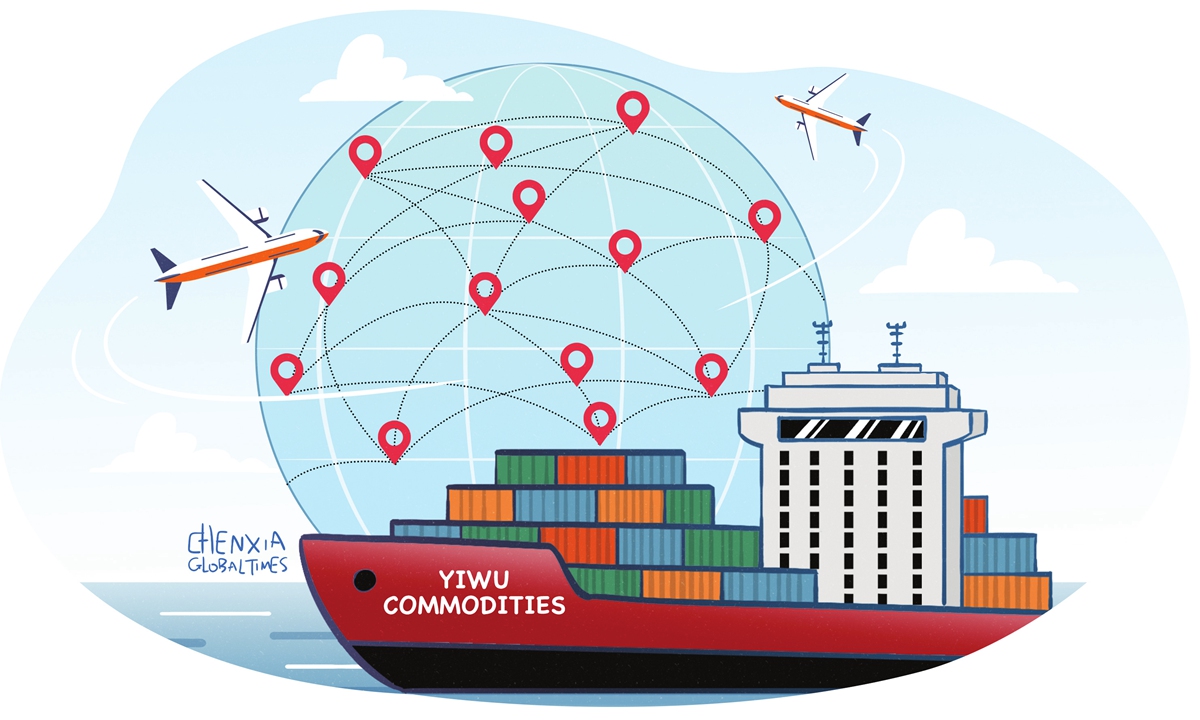
Illustration: Chen Xia/Global Times
How to cut off and squeeze out the Chinese manufacturing extrusion industry value chain, supply chain and trade chain has become one of the most important political topics in Washington. The latest news is that US legislators are urging for increased scrutiny of Shein's business practices, demanding that the fashion retailer provide evidence that the products it sells do not involve "forced labor," and they are also attempting to use human rights issues to prevent the company from listing on US exchanges.
Since former US president Donald Trump initiated the trade war with China, Washington's strategy toward China has undergone a significant change in direction, with China now being viewed as the US' primary competitor. The main tactic employed by the US in competing with China is to sever ties with China and squeeze it out by restructuring industrial and trade chains.
Can Washington achieve its goal?
I am currently attending a Belt and Road international forum in Yiwu, East China's Zhejiang Province. Trade has the power to transform the world, and the development of Yiwu, a small city in central Zhejiang, can be considered as one of the most illustrative examples of this phenomenon.
Yiwu has now become a central city for "buying global goods and selling global goods," with 2.1 million types of goods from around the world converging here, and Made-in-China goods are sold to more than 230 countries and regions worldwide.
Registering a foreign trade company in Yiwu only takes three days, and the fastest clearance procedure for exporting goods takes only one minute. Yiwu is not only the market with the most complete small commodities but also can deliver goods to customers at the fastest speed.
Currently, Yiwu attracts over 560,000 overseas buyers annually for procurement purposes, while also hosting more than 15,000 permanent overseas buyers from over 100 countries and regions. Yiwu has trade relations with 233 countries and regions worldwide, with a total foreign trade volume exceeding 470 billion yuan ($65.6 billion) from January to October. This figure surpasses the total exports of 18 provinces in China.
Yiwu's commodities are not only an indispensable part of the global industrial chain, supply chain, and trade chain, but they also provide an essential driving force for the development of these chains in the future.
During the epic journey of China's reform and opening-up, Yiwu salesmen went from walking around the streets shaking Rattle-drums to creating the miracle of the world's largest small commodity market where "you can buy whatever you want." They have created a miracle in global trade history. Yiwu's experience proves that China's reform and opening-up over the past 40 years has brought huge changes to the global trade, relying on the vigorous vitality released through the reform of the market economy and opening up to the world.
The Yiwu spirit provides strong spiritual support for creating a new path for the Belt and Road Initiative. Behind Yiwu going global is the strong support of "Made in China", and the people of Yiwu have always had a spiritual motivation to integrate into the world through openness and pursue peaceful development through mutual benefit.
The people of Yiwu have integrated openness into their blood, and at the same time brought the dividends of China's economic development to the world. They have established a trade network covering more than 230 countries and regions around the world, and established 275 international lines. As a result, many people living in poverty have access to modern appliances such as mobile phones and rice cookers. Today, in Yiwu, people are working hard to enhance the resilience of this network during the downturn in international trade.
The people of Yiwu are not like the colonists of the British and other European powers who went all over the world to forcefully grab markets. A city can make such a huge contribution to global trade and form a positive energy that is rare in the history of world trade since the rise of the West. These are all issues worthy of discussion.
Look at the current US economy, the Western economy and the global economy. What will it be like if they are detached from Yiwu? This may not be hard to predict.
If we look at the changes the city of Yiwu has gone through, especially after talking to Yiwu's small commodity merchants, we will definitely feel that although the "decoupling" promoted by the US will have an impact on Yiwu's exports, it won't be able to meet its objectives.
The author is a senior editor with the People's Daily, and currently a senior fellow with the Chongyang Institute for Financial Studies at Renmin University of China. dinggang@globaltimes.com.cn. Follow him on X @dinggangchina


